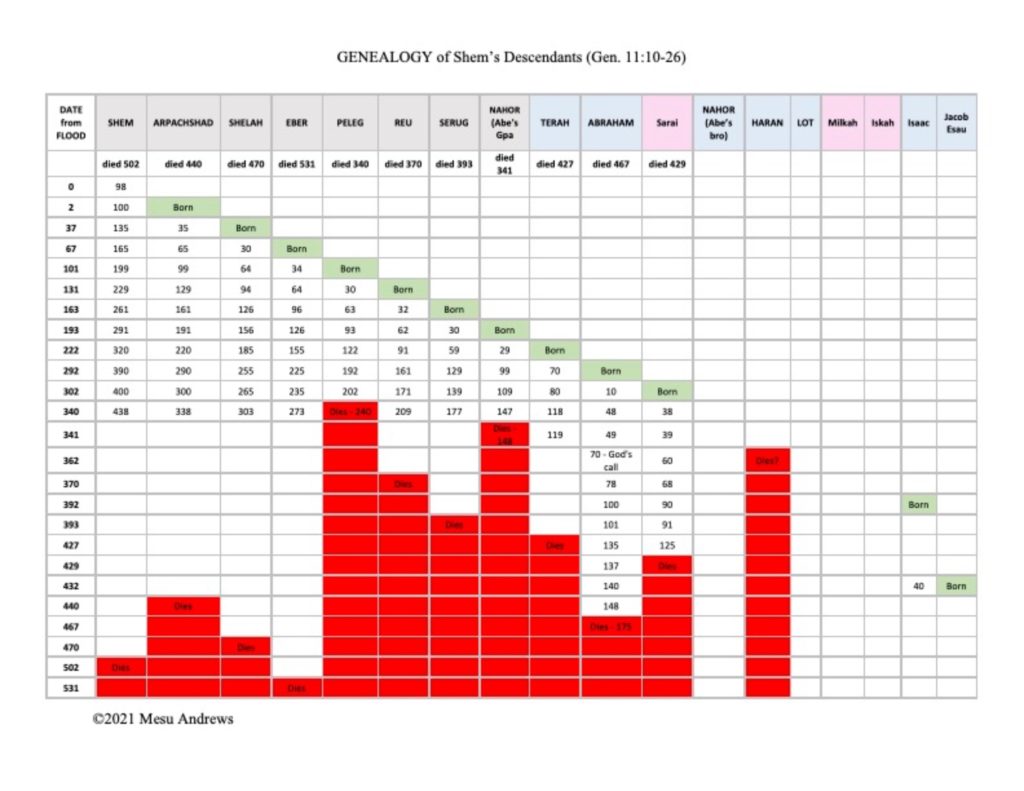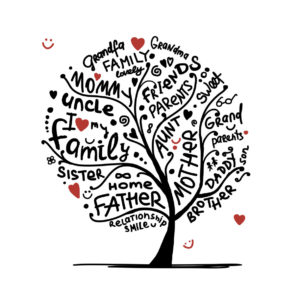Let’s face it. Every family has a weird Uncle Harold. Our family has several–though not named Harold–and they sometimes make celebrating the holidays a little uncomfortable.
Can you relate?
Have you ever wondered why God came to earth as:
- a Baby in a manger rather than a soldier with a sword.
- the son of a poor carpenter instead of a wealthy priest.
- a boy raised in lowly Galilee rather than near the holy Temple in Jerusalem.
I believe at least one reason God lived in such humble circumstances was to make Himself relatable to even the most common folks on earth. In Jesus’s family tree, we’ll find more than one weird Uncle Harold because His ancestral past was as checkered as our own.
Digging Into the Roots
The Gospels of both Matthew and Luke delve deeply into Jesus’ family history. Matthew 1:1-17 proves His lineage back to Abraham, and Luke 3:23-28 goes all the way back to Adam.
If you read the two accounts carefully, you’ll notice the roots of the family tree split when naming David’s sons–Luke names Nathan as Jesus’s forefather, and Matthew names Solomon. Why? Some believe Luke gives Mary’s lineage and Matthew gives Joseph’s, which makes sense since Matthew was writing his Gospel for a Jewish audience and Luke–the meticulous, Gentile doctor–was writing mainly to the Gentiles.
Matthew’s account to the Jews records Jesus’s connection to the great King Solomon, but it also includes his shadowy matriarchs: the trickster Canaanite, Tamar; Jericho’s prostitute, Rahab; and the Moabitess, Ruth–all foreign women with a colorful past.
Luke’s Gentile audience would have been more interested in knowing the Savior’s lineage as it related to the Creation of the world, so his Gospel included Jesus’s lineage all the way back to Adam.
Ages Before and After the Flood
Speaking of Genesis–have you ever studied its looooooong genealogies–specifically, the ones that chronicled pre-flood and post-flood lives in centuries rather than decades. Adam lived 930 years and most others (before the flood) into their 800’s and 900’s.
There were only two exceptions:
- Enoch, who was “taken away” by God (without dying) at age 365 because he “walked faithfully with God” (5:24).
- Lamech, Noah’s father, only made it to 777. He may have died in the flood (5:28-31).
After the Flood, family ages decreased dramatically. Instead of up to a 900-year lifespan, Noah’s son, Shem, lived “only” six hundred years. Genesis 11 chronicles the post-flood generations and their declining lifespans: Generations after Shem, Abraham was born to Terah. Shem was still alive when Terah died at age 205. CLICK HERE to download and print the chart above if you’d like to fill in the rest of the ages and see how old the family members were when each post-flood forefather’s death occurred.
Generations after Shem, Abraham was born to Terah. Shem was still alive when Terah died at age 205. CLICK HERE to download and print the chart above if you’d like to fill in the rest of the ages and see how old the family members were when each post-flood forefather’s death occurred.
Intrigue in Abraham’s Family
Why am I going into such detail about Shem, Terah, and Abraham–and their ages? While reading through Genesis in my ESV Illuminated Bible Journal (my Amazon aff link) during 2021, I was intrigued by Abraham’s family tree. The following verses in Genesis 11 raised the little hairs on my arms . . . something in Terah’s family was amiss.
“Now these are the generations of Terah. Terah fathered Abram, Nahor, and Haran; and Haran fathered Lot. Haran died in the presence of his father Terah in the land of his kindred, in Ur of the Chaldeans.And Abram and Nahor took wives. The name of Abram’s wife was Sarai, and the name of Nahor’s wife, Milcah, the daughter of Haran the father of Milcah and Iscah . . . Terah took Abram his son and Lot the son of Haran, his grandson, and Sarai his daughter-in-law, his son Abram’s wife, and they went forth together from Ur of the Chaldeans to go into the land of Canaan, but when they came to Haran, they settled there.” Genesis 11:27–31 (emphasis added)
My Immediate Reaction
In my journal on February 6, 2021, I wrote:
It feels like something tragic happened to Haran, Lord. Something that split the family. Perhaps a misunderstanding or an accident–that cost Haran his life. Terah left the land of Ur, taking his eldest son and Haran’s son, leaving his middle son behind to marry Haran’s daughter. There’s no mention of Haran’s second daughter’s fate (Iscah). Did she die with her father “in the presence of…Terah” (v.28)? Or was she simply too unimportant to mention?
Needed More Research
After re-reading Genesis 11:27-31 and contemplating the lives of those very real people and their very real emotions, these questions came to mind:
- Did Haran actually die in the presence of his father Terah?
- How did Haran die?
- Who else (if anyone) witnessed it?
- Might Iscah have died with her father Haran since she’s not mentioned as staying in Ur or leaving with her grandfather Terah?
- What sort of tragedy could cause this family to splinter? People in ancient Mesopotamia didn’t just up and move to another country!
- Why did Terah choose Canaan as his destination? What made him settle in Haran instead? Was it called Haran before he settled there, or did he name it Haran after his dead son? (In some translations, it’s spelled differently than his son’s name.)
- Sarai wasn’t just Abraham’s (Abram’s) wife and Terah’s daughter-in-law; she was also Terah’s daughter as we later discover in Genesis 20:12.
- Why did Terah’s son, Nahor (named after his grandfather), remain behind in Ur–and marry his dead brother’s daughter?
Family History to Die For
 If you’re interested in fleshing out some of those questions with me, I hope you’ll subscribe to receive my monthly FictionFix through Patreon.com for the 2022 serial novella, Sons of Terah. CLICK HERE for more information.
If you’re interested in fleshing out some of those questions with me, I hope you’ll subscribe to receive my monthly FictionFix through Patreon.com for the 2022 serial novella, Sons of Terah. CLICK HERE for more information.
I believe we’ll discover together that Abraham’s family, like our own, has all the “normal” bumps and warts and glorious oddities that reveal our need for a Savior. Whether we’re studying Jesus’s genealogy or Abraham’s or our own, we’ll discover everyone in that lineage–including me–needs a Savior to overcome the sin passed down from our original parents in the Garden.
Thank You, Jesus, for Your sacrifice and the grace that brings me into Your family–even if I’M the weird (Aunt) Uncle Harold. 💡
Today’s Question:
- What questions came to YOUR mind when you read Jesus’s genealogies or the ones in Genesis?





Comments 6
I agree that Luke probably records Mary’s lineage and I believe the bible needs both Jesus’ lineages. Joseph’s is the family’s roots and confers legitimacy and respectability. Mary’s lineage ensures that Jesus’ bloodline (through blood) is also from the promise to David.
Author
Yes, Micheal. Absolutely right. Thanks for clarifying! I’m guessing you love Prov. 25:2 as much as I do, Brother . . . “It is the glory of God to conceal a matter; to search out a matter is the glory of kings.” Matthew and Luke had their own purposes for recording the lineages, and we get the privilege of searching the written Word to bow in awe to God’s plan. Keep sharpening iron!
I love your thoughts and comments. Truthfully I had not really noticed that the two gospels differed in the lineage. It all makes sense when you think about it, as Michael said. Of course Mary’s lineage was hugely important but Jews would always look at the “father’s” lineage, so Matthews line there would be appropriate. As for the ages of life and Terah’s family – the questions are fascinating. My mind is full of thoughts. I do genealogy of our family for fun and have come across a few weird things – one is a daughter who is supposed to be born the day the parents get married. The problem is there is no birth record for this daughter under any of her names on that day in New Zealand, however she is married under that name and her father is recorded on the marriage, also her birth date is recorded on her death certificate as being the day of her parents marriage. So who is she and what is the the story of her birth? You can see why I am fascinated with the “history” you have suggested. I wait to see what you come up with. In the meantime………………………………………………………
Author
My brother is our family historian, Beryl, and has found all sorts of twists and turns with a few surprises as well. I can’t wait to dig into Abraham’s family. I’ve already found some interesting info on the life and culture of Ancient Mesopotamia that could have impacted the faithful family lineage of Seth to break ties and leave that increasingly pagan culture. The Lord often whispers fun plot twists as I write–so even I’m surprised by the stories that emerge! LOL!
I can’t wait to read all about it. I’m sure you have some fascinating ideas.
I’ve finished the first installment on Abraham’s family and can’t wait to hear what subscribers think on January 24th! I think I’m gonna love this series! 🙌🎉